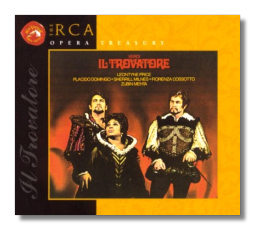
The Internet's Premier Classical Music Source
Related Links
- Verdi Reviews
- Latest Reviews
- More Reviews
-
By Composer
-
Collections
DVD & Blu-ray
Books
Concert Reviews
Articles/Interviews
Software
Audio
Search Amazon
Recommended Links
Site News
 CD Review
CD Review
Giuseppe Verdi

Il Trovatore
- Leontyne Price (Leonora)
- Plácido Domingo (Manrico)
- Sherrill Milnes (Conte di Luna)
- Fiorenza Cossotto (Azucena)
- Bonaldo Giaiotti (Ferrando)
Ambrosian Opera Chorus
New Philharmonia Orchestra/Zubin Mehta
RCA Victor Red Seal 74321-39504-2 ADD 2CDs: 70:47, 65:57
In spite of its complicated and unbelievable plot (Gilbert and Sullivan mocked it in two of their light operas), Il Trovatore has been in no danger of neglect ever since its première in 1853. Its characters are kept from dull unidimensionality by the elemental force of Verdi's tunes, and by the driving orchestral accompaniments. Someone once said that the latter function like a giant guitar, and the simile is accurate, given the fact that the Il Trovatore orchestra seems to spend much of the time furiously strumming away.
It's also been said that a performance of this opera requires nothing less than four of the greatest singers in the world. That's a bit of an exaggeration, although it is true that the four principal characters must be wall matched; one weak link, and Il Trovatore falters. Alas, because of contractual limitations and Father Time, no single record company has been able to assemble a dream cast. Some recordings, however, are more satisfying than others, and this is one of them.
Leontyne Price recorded the role of Leonora three times. This version from 1969 or 1970 (RCA's information is contradictory) probably is the best – Price's singing is at its peak, and her interpretation is more mature than it was the first time around. Talk about perfection! I can't forget the glorious sound of her voice in certain phrases, such as at the very end of Part Two when she sings "Sei tu dal ciel disceso, o in ciel son io con te?" (Are you come down from heaven, or am I in heaven with you?) She probably was the greatest Leonora of the 1960s and 70s. Domingo, too, was no stranger to this opera. His voice is at its youthful finest in this recording, and he sings the title role with good taste. Come to think of it, a little bad taste would have been welcome!
Sherrill Milnes's intelligence, and even aspects of the voice itself, remind me of another American baritone, Leonard Warren. Warren was the great Conte di Luna of the 50s, and Milnes wasn't far off from that standard in his own decade. What Milnes does miss, however, is the character's monomaniacal obsessions: vengeance and lust. He depicts a character who is certainly angry, but he needs to sound almost insane. Finally, Fiorenza Cossotto is a robust Azucena. Her healthy singing suggests a gypsy woman who could execute a half-nelson on both of the male leads. An older voice would have helped, but I really can't fault Cossotto for sounding so good.
The supporting roles are done ably, although I've heard more interesting Ferrandos than Giaiotti's. (I have special affection for Giorgio Tozzi in his set with Renata Tebaldi and Mario del Monaco.) Mehta is exciting, but not really Italianate, and perhaps he too is guilty of being just a little too tasteful. The old Italians – men like Erede and Previtali – really knew how to make this score go.
When RCA first reissued this recording on CD, the discs were plagued with distortion at the vocal climaxes. I had hoped that this new reissue would correct that problem. Unfortunately, the peaking still is there, so I assume that the problem lies with the master tape. (Funny that I don't remember this being a problem with the LPs.) At any rate, the new remastering is an improvement in other areas. Now the soundstage has been opened, and the voices bloom a little more. The new packaging puts the discs and a larger libretto in a box.
Except for the sonic problems, this is a recommendable recording – probably among the top handful of Trovatori.
Copyright © 1999, Raymond Tuttle


















